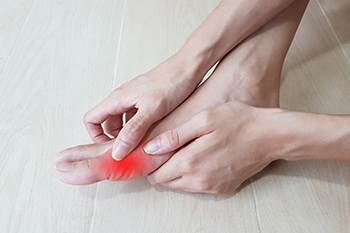
(908) 381-8160Berkeley Heights

Gout, which is typically associated with men, can also affect women. Characterized by sudden, intense joint pain, swelling, and stiffness, this inflammatory condition primarily targets the feet and ankles in women. Symptoms of gout include redness, warmth, and limited mobility. Several factors contribute to gout in older women, including obesity, high blood pressure, and menopause, which heightens the risk. Menopausal hormonal changes disrupt uric acid balance, rendering women more susceptible to gout flares. Medication such as diuretics, commonly prescribed for high blood pressure, also may elevate uric acid levels, further affecting women. Postmenopausal women face an increased risk due to hormonal shifts. As estrogen declines during menopause, the risk of gout rises. Recognizing this connection is important for monitoring signs of gout in older women. Effective gout management in women includes implementing dietary modifications to reduce purine rich foods, in addition to weight maintenance and proper hydration. A podiatrist may prescribe certain medications that can help control uric acid levels. Gout's impact on women, particularly those who are postmenopausal, calls for some level of proactive measures. For more information about how to manage gout, it is suggested that you make an appointment with a podiatrist.
Gout is a painful condition that can be treated. If you are seeking treatment, contact Dr. Janet Leicht from New Jersey. Our doctor will treat your foot and ankle needs.
What Is Gout?
Gout is a form of arthritis that is characterized by sudden, severe attacks of pain, redness, and tenderness in the joints. The condition usually affects the joint at the base of the big toe. A gout attack can occur at any random time, such as the middle of the night while you are asleep.
Symptoms
Risk Factors
Prior to visiting your podiatrist to receive treatment for gout, there are a few things you should do beforehand. If you have gout you should write down your symptoms--including when they started and how often you experience them, important medical information you may have, and any questions you may have. Writing down these three things will help your podiatrist in assessing your specific situation so that he or she may provide the best route of treatment for you.
If you have any questions, please feel free to contact our office located in Berkeley Heights, NJ . We offer the newest diagnostic and treatment technologies for all your foot care needs.